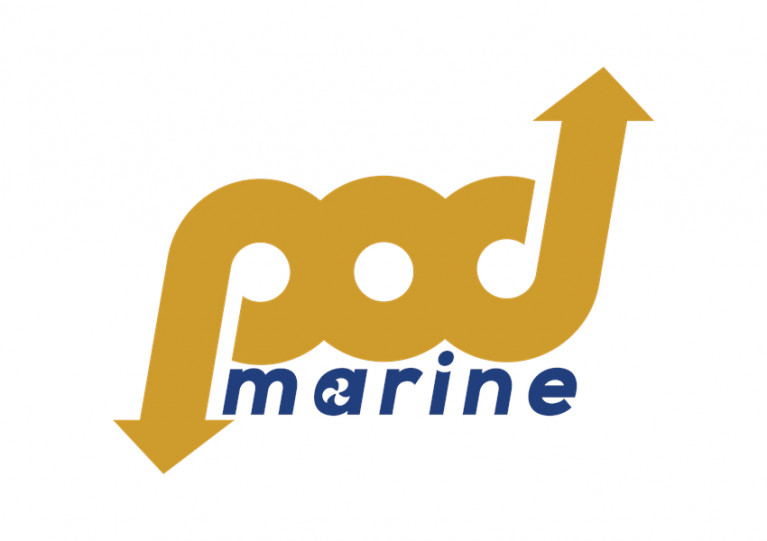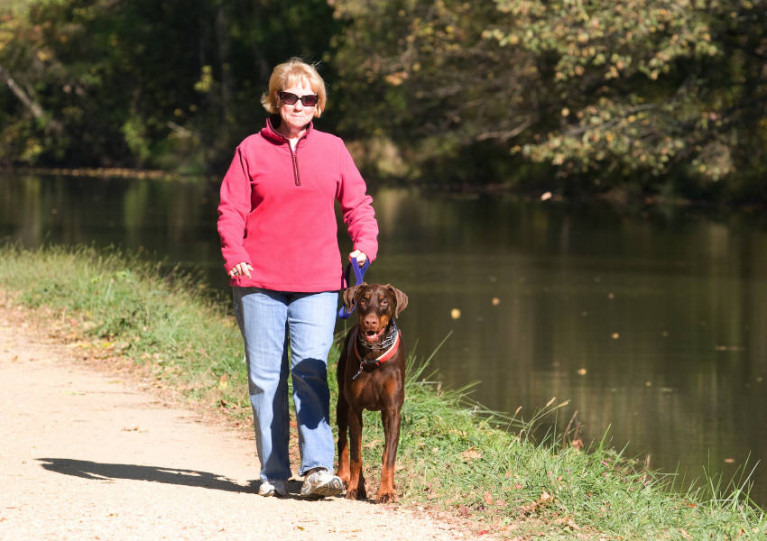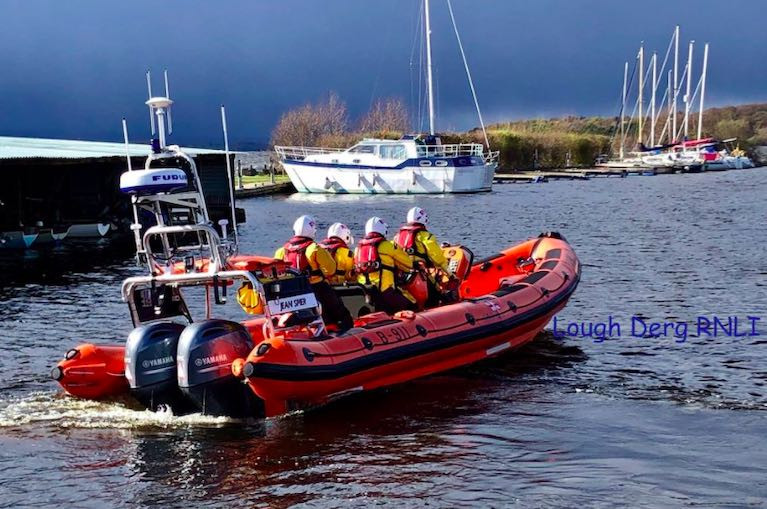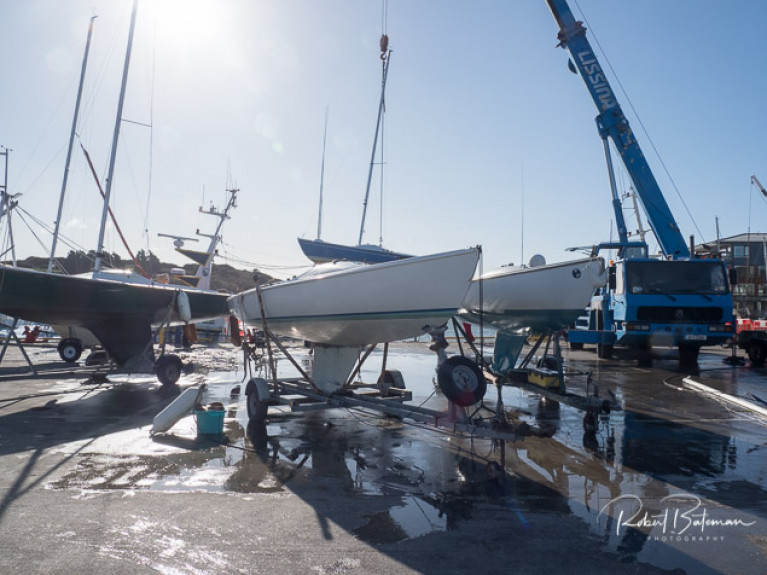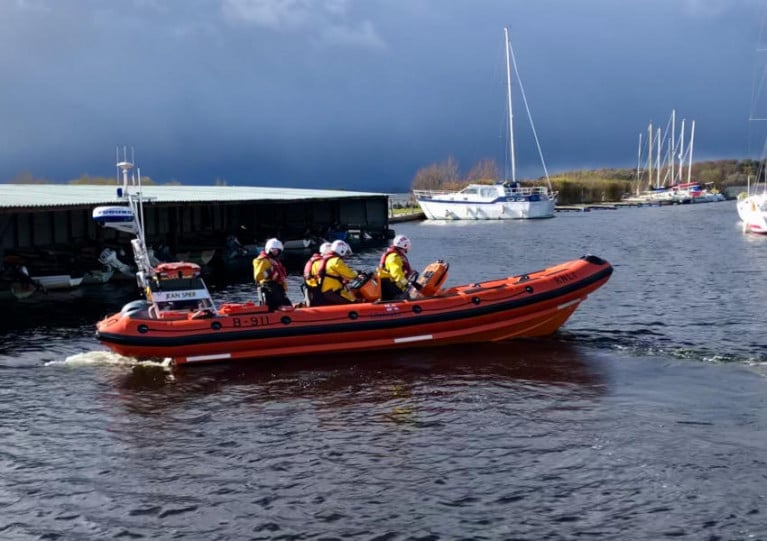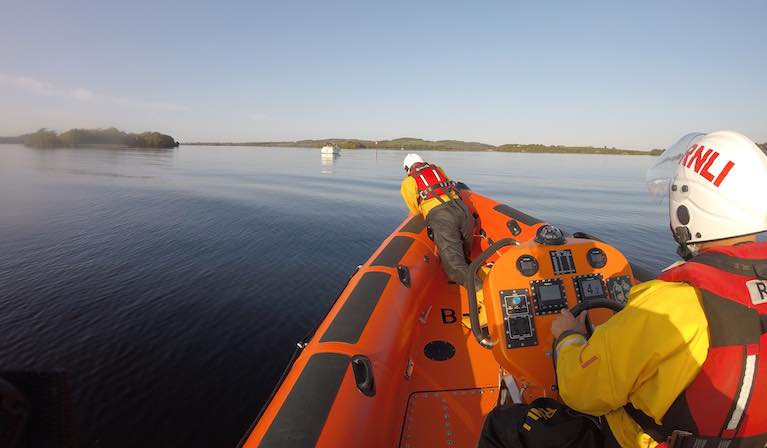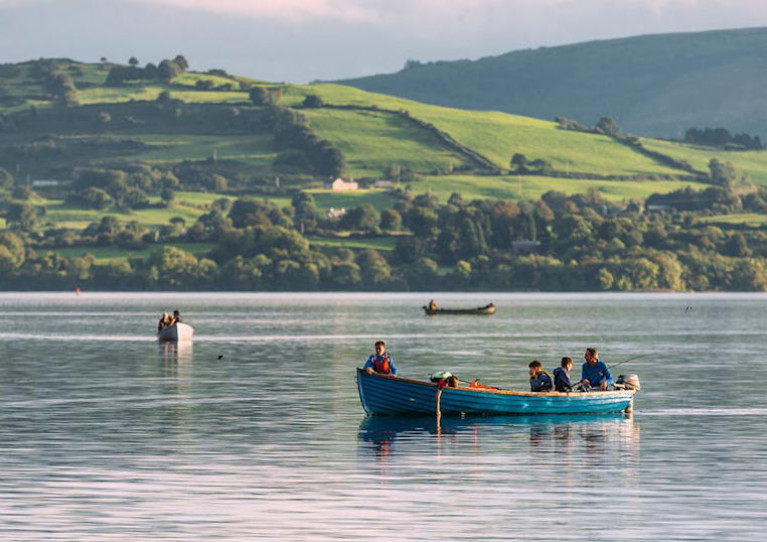Displaying items by tag: Lough Derg
RNLI lifeboat volunteers come from a multiplicity of backgrounds. And though some may have no previous maritime experience before they enrol, this is not an issue as the RNLI provide a comprehensive and rigorous programme that equips trainees to meet all necessary requirements to be crew on a lifeboat. Being an RNLI lifeboat crew is one of the most exciting and fulfilling roles a person can perform; it offers volunteers the opportunity to make a difference in their local community, to save lives, and to be part of an inclusive and diverse organisation.
Stephen Seymour is a dairy farmer who lives and farms close to Dromineer. He says, having a greater amount of free time, he decided to find out more about joining the lifeboat crew. Stephen says that a strong impetus for him to volunteer with the RNLI, was the ‘opportunity it would provide to save lives on the lake’.
Ania Skrzypczynska, a graphic designer, moved to Dromineer a year ago. She says following encouragement from her neighbour, Eleanor Hooker, a volunteer helm at the station, she decided to visit the station and to find out what volunteering with the lifeboat would entail. Ania says ‘boating is very new to me and lifeboating is certainly not something I was familiar with, however, it sounded like an exciting adventure’ with the chance to learn new skills. Even though initially she says she was a ‘bit apprehensive about this big commitment’, she’s glad she’s joined the crew and hopes to be able to ‘make a positive impact in someone’s life’.
Ciara Moylan, a Rooms Division Manager at the Abbey Court Hotel in Nenagh, lives in Dromineer village. She says ‘living so close to a lifeboat station and growing up on the lake, it's always something I've wanted to be a part of’. Of her experience as an RNLI volunteer thus far, Ciara says it’s ‘extremely rewarding and I am very grateful to be part of this organization and having access to all of the knowledge I've already received and will continue to receive’.
Richard Nolan runs a Consulting Business. He says after ‘moving home from London, I was excited to get involved in various local causes’ to help where he could and to get to know local people having been away for so long. Richard says that living by the lake, he was ‘particularly excited to see positions advertised with the RNLI’ as it presented him with the opportunity to support his community and also to get to know the lake. Of his initial training over the past few months, Richard says he recognised ‘this wasn’t going to be an average volunteering opportunity’ but says that the ‘team have all been phenomenally supportive’.
Dom Sharkey, a senior helm at the station says it’s ‘great to see local men and women volunteer for the lifeboat, I’m delighted to welcome our four enthusiastic new recruits to the Lough Derg RNLI crew’.
Lough Derg RNLI Lifeboat Assists 20ft Motorboat with Engine Failure South of the Scilly Islands
At 11.30 am today, Sunday 25 April, whilst out on exercise, Lough Derg RNLI volunteers in County Tipperary noticed the passengers of a 20ft motorboat waving to them to signal their distress.
The motorboat was south of the Scilly Islands and lying side on to the weather. The wind was easterly, F3, with good visibility.
The lifeboat, with helm Eleanor Hooker, Joe O’Donoghue, Chris Parker and Ania Skrzypczynska on board, immediately made way to the vessel. The two people on board the casualty vessel asked for assistance as their boat had suffered engine failure.
The lifeboat informed the Valentia Coast Guard of the situation. The crew set up an astern tow to take the vessel with her passengers back to Garrykennedy Harbour, the closest available safe harbour, and from where they had started their journey.
At 12.13 pm the casualty vessel was safely tied alongside at Garrykennedy Harbour. At 12.18 pm Lough Derg RNLI lifeboat, Jean Spier, departed the scene to return to station.
Lough Derg RNLI have announced the appointment of Dr Christine O’Malley as lifeboat operations manager.
Dr O’Malley, who took up the post on 8 January this year after the retirement of Liam Maloney, is now responsible for all activities at the lifeboat station on the Shannon Navigation.
The retired consultant geriatrician, and regular columnist for the Medical Independent, joined Lough Derg RNLI in 2019 as a volunteer deputy launching authority — a role that she now hands over to Maloney.
In her new position, Dr O’Malley is receiving support and guidance from Owen Medland, RNLI regional lifesaving lead for Ireland; Peter Harty, RNLI area lifesaving manager for the East of Ireland, and RNLI crew assessor trainer Helena Duggan, as well as the dedicated volunteers at Lough Derg RNLI.
“Already a highly respected member of the station, Christine brings a wealth of leadership and management experience from her medical career,” Harty says.
“Christine has come onboard as we progress towards a year in which we anticipate a high volume of ‘staycationers’ enjoying Lough Derg.”
Lough Derg RNLI operates from the premises of Lough Derg Yacht Club at Dromineer, midway down the east shore of the lake in Co Tipperary.
Lough Derg’s Shannon Sailing Ltd Acquired by POD Marine
Dun Laoghaire Harbour-based POD Marine Ltd recently announced the acquisition of Lough Derg boating firm Shannon Sailing Ltd.
The deal involved the transfer of an 80-plus-berth, private and enclosed marina with swinging moorings, chandlery and engineering workshop based on the inland waterway in the village of Dromineer, Co Tipperary.
Equipment in the purchase includes a hydraulic crane for smaller loads and a 35-ton boat lift for larger vessels.
The site also comprises a private car park, slipway, diesel pump and pump-out facilities.
As with its base at Dun Laoghaire’s West Pier, POD Marine says the site in Dromineer has ample space for boat and trailer storage.
The company also confirms that the Dromineer business will continue as an ongoing concern.
Proposal for ‘Shannon Greenway’ to Connect Limerick with Lough Derg
A working group has been established to develop a proposal for a Shannon Greenway connecting the city of Limerick with Lough Derg.
Waterways Ireland says it is working together with Clare County Council, Limerick City & County Council and others on the plans, which are still at an early concept stage.
However, it is understood that the working group has already been charged with examining possible route options and designs, as well as environmental considerations, costs and funding sources.
Also being considered is whether public lands between Limerick and Tuamgraney/Scarriff in Co Clare — especially the towpaths of the Park and Erinagh Canals and various ESB embankments — could be used for the project.
Lough Derg RNLI Feature on BBC TV Series 'Saving Lives at Sea'
The volunteer lifeboat crew at Lough Derg RNLI will be taking to the small screen again on Tuesday 17 November at 8 pm, as they feature in the seventh episode of the BBC TV series Saving Lives at Sea.
Real-life rescue footage captured on their helmet cameras gives a frontline view of how the charity’s lifesavers risk their own lives as they go to the aid of those in danger at sea and strive to save everyone.
Now in its fifth series, the 10-part documentary showcases the lifesaving work of the RNLI’s volunteer lifeboat crews and lifeguards from around Ireland and the UK. The series will air on BBC Two on Tuesdays at 8 pm, as well as being available on BBC iPlayer following broadcast.
Real rescue footage is accompanied by interviews from the volunteer lifeboat crews and lifeguards alongside the people they rescue and their families.
In a forthcoming episode, to be aired on Tuesday 17 November at 8 pm on BBC Two, viewers will see Lough Derg RNLI rescue two kayakers who got into extreme difficulty in rough weather, alongside rescue stories from their colleagues at other stations and beaches around our coasts.
Owen Cavanagh, Helm of the Lough Derg RNLI lifeboat crew featured in the 17 November episode, says: ‘It’s great that with the Saving Lives at Sea programme our supporters can see what we do out on a Shout, and from the comfort of their own home too. This year the pandemic has presented RNLI volunteers with additional challenges, but we’ve continued to maintain a 24/7 search and rescue service. And due to Covid19, fundraising events have been cancelled, with a drop in our charitable income. Without the generous support and donations from the public, we wouldn’t be able to save lives at sea. We need their support more than ever during these challenging
times.’
During 2019, RNLI lifeboat crews around Ireland and the UK rescued
- 9,412 people, saving 211
- lives, while the charity’s lifeguards aided
- 32,207 people and saved 118
- lives on some of the UK’s busiest beaches.
Lough Derg Freshwater Regatta Organisers Keep Look Out for COVID-19 Restriction Changes
Just as Ireland's one-design keelboat classes were gearing up for the last blast of the season this weekend, anticipated COVID-19 restriction hikes are threatening the staging of the annual regatta at Dromineer in County Tipperary.
Flying Fifteens, Dragons, Squibs and SB20s are all scheduled to compete.
Organisers of the traditional end of season freshwater regatta at Lough Derg Yacht Club (9-11th October) will be watching out for COVID-19 level announcements today. The much-anticipated hike in restrictions aired on Sunday night (NPHET advice for a countrywide Level Five lockdown) would bring the curtain down on the popular autumn event that typically sees boats travelling from Northern Ireland, Dublin, Cork and other ports for the three-day event.
Some of Dublin's One Design keelboat classes are hoping that current Level 3 restrictions due to expire this Friday will allow travelling out of the county for the last sail of the season. All Dublin club racing has been cancelled over the last three weeks due to the county-wide restrictions.
Lough Derg Yacht Club has posted a Notice of Race with the rider that the 'Club reserves the right to cancel this event with short notice and all fees will be refunded' if it cannot go ahead.
In Kinsale, Squibs were hauled out at the weekend in anticipation of the Squib Inland Championships that are being held as part of the Lough Derg event.
Tuesday 13 October at 8pm is the date and time for your TV diary to see the volunteer crew of Lough Derg RNLI feature in the current series of Saving Lives at Sea on BBC Two.
Viewers will see Lough Derg’s lifeboat crew rescue a man who fell overboard in rough weather and an eerie night time launch in fog, alongside rescue stories from their colleagues at other stations and beaches around our coasts.
Saving Lives at Sea features real-life rescue footage captured on helmet cameras gives a frontline view of how the RNLI’s lifesavers risk their own lives as they go to the aid of those in danger at sea.
That’s accompanied by emotive interviews from the volunteer lifeboat crews and lifeguards from around Ireland and the UK, alongside the people they rescue and their families.
Lough Derg’s upcoming profile follows on from Lough Ree lifesavers’ appearance in last year’s series of the hit TV documentary, as previously reported on Afloat.ie.
And in next week's episode, the volunteer crew of Skerries RNLI will feature with their rescue of a teenage paddle boarder who was blown out to sea.
“It’s great that we can showcase the lifesaving work of RNLI volunteers in a TV programme like this,” said Lough Derg helm Eleanor Hooker.
“In recent months, the pandemic has presented RNLI volunteers with additional challenges, but we’ve continued to maintain a 24/7 search and rescue service.
“This year, due to Covid, fundraising events have been cancelled and we’ve seen a drop in our charitable income. Without the generous support and donations from the public, we wouldn’t be able to save lives at sea.
“It’s great that with the Saving Lives at Sea programme our supporters can see what we do out on a shout, and from the comfort of their own home. We need their support more than ever during these challenging times.”
Saving Lives at Sea is broadcast Tuesdays at 8pm on BBC Two, NI, and viewers in the UK can also watch the series on demand following broadcast on the BBC iPlayer.
Lough Derg RNLI Assists Four Adults on a 30-ft Cruiser Aground
Lough Derg RNLI assisted four adults on a 30-ft cruiser aground at Skehanagh, on eastern, Tipperary shore, of Lough Derg behind Illaunmor.
At 5.15 pm this afternoon, Sunday, September 20, as Lough Derg RNLI volunteers were arriving for a training exercise, Valentia Coast Guard requested the lifeboat to launch to assist 4 people on a 30ft cruiser, who reported their boat aground by Dromaan Harbour on the County Clare Shore.
At 5.19 pm the lifeboat Jean Spier launched with helm Owen Cavanagh, crew Keith Brennan and Tom Hayes on board. Visibility was very good, and the lake flat calm.
When the cruiser was not located at Dromaan Harbour, Valentia Coast Guard supplied the lifeboat with the telephone number for the casualty vessel.
Lifeboat crew asked the casualties to describe what they could see around them, and from their descriptions, the lifeboat volunteers accurately determined that they were at Skehanagh, north of Illaunmor on the Tipperary shore.
When the lifeboat arrived on scene they found all on board safe and unharmed and wearing their lifejackets. An RNLI volunteer transferred across to the casualty vessel. Once he was satisfied that the vessel was not holed, he set up for a tow.
The lifeboat took the cruiser off the rocks and out into safe water, where an RNLI volunteer checked that its drives and rudder were in good working order.
The lifeboat took their crew member back onto the lifeboat and the cruiser continued its passage.
The lifeboat departed the scene at 6.26 pm and was back at station at 6.33 pm.
Liam Maloney, Lifeboat Operations Manager at Lough Derg RNLI advises boat users to ‘study your charts and stay on the navigation channel when passage planning.’
Caution Advised On Lough Derg As Navigation Marker Near Mountshannon Off Station
Waterways Ireland advises all masters of vessels and water users on Lough Derg to proceed with caution moving in or out of Mountshannon as the green navigation marker for the western side of Cribby Island is currently off station.
Lough Derg has seen a rise in rescue callouts to cruisers in distress over recent weeks amid a boom in the Shannon cruiser hire industry driven by late summer ‘staycations’ on the waterways, as previously reported on Afloat.ie.




























